Ubiquitin Antibodies in Scientific Research
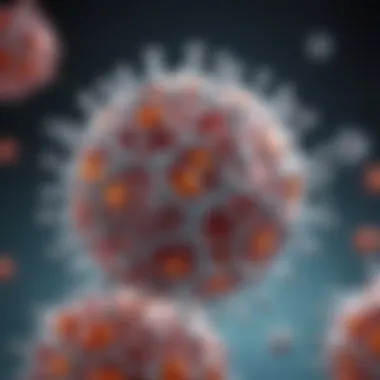
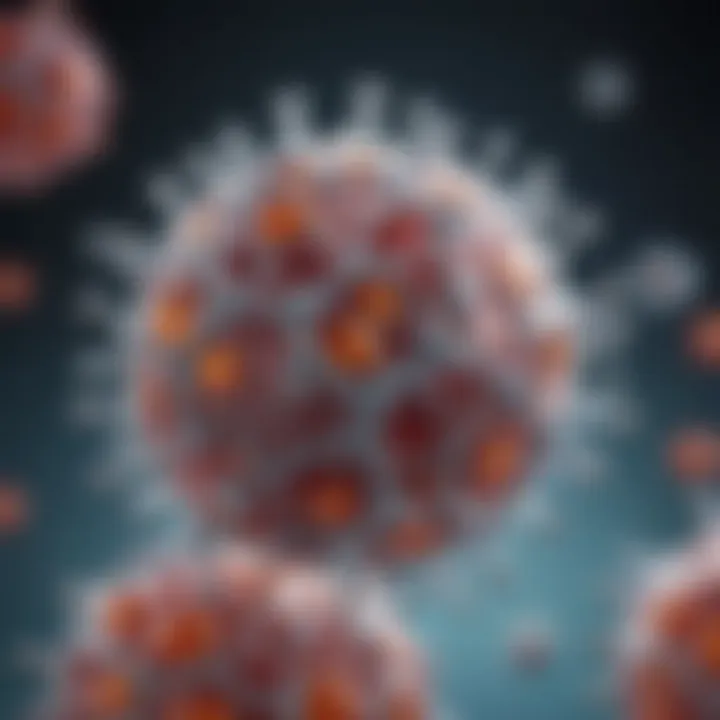
Intro
In the sprawling landscape of cellular biology, ubiquitin antibodies emerge as critical players in the intricate world of protein regulation. The concept of ubiquitination—where proteins are tagged for degradation or modulation plays a significant role in maintaining cellular homeostasis. By harnessing the power of ubiquitin antibodies, researchers gain valuable insights into this fundamental process. This article embarks on a thorough journey through the realm of ubiquitin antibodies, exploring their discovery, functionality, production techniques, and their substantial implications across various scientific domains, including cancer research and neurobiology.
Research Overview
Summary of Key Findings
Ubiquitin antibodies have carved a niche in biological research, enabling scientists to decipher the complex mechanisms underlying protein regulation. Key findings include:
- Role in Disease: Ubiquitin antibodies have been pivotal in identifying misregulated proteins linked to diseases such as cancer and neurodegenerative disorders. This interplay highlights the importance of ubiquitination in health and disease.
- Technological Advancements: Recent developments in antibody production technologies have enhanced the specificity and sensitivity of ubiquitin antibodies, boosting their application in cutting-edge research.
- Broad Applications: Beyond cancer research, these antibodies are proving invaluable in immunology, developmental biology, and even virology, illuminating diverse biological pathways.
Importance of the Research
Understanding the mechanisms mediated by ubiquitin antibodies is not merely an academic exercise; rather, it has practical applications that can lead to therapeutic innovations. By studying these antibodies, researchers can:
- Develop targeted therapies that exploit the ubiquitination pathways.
- Unravel the complexities of protein interactions in cellular processes.
- Explore potential biomarkers for diagnosing various diseases, enhancing early detection and intervention strategies.
"Ubiquitin antibodies serve as a key to unlock mysteries in the cellular arena, revealing intricate pathways and offering pathways toward innovative research and therapies."
Methodology
Study Design
The examination of ubiquitin antibodies involves a blend of experimental and analytical approaches, which provide insights into their properties and functions. Common methodologies include:
- Immunoprecipitation: This technique captures ubiquitinated proteins using specific antibodies, allowing researchers to study their interactions and degradation pathways.
- Western Blotting: A standard method where proteins are separated by gel electrophoresis and transferred to a membrane, enabling the detection of specific ubiquitinated proteins using antibodies.
Data Collection Techniques
Accurate data collection is essential for understanding ubiquitin antibodies. Techniques often utilized in gathering relevant data include:
- ** ELISA (Enzyme-Linked Immunosorbent Assay)**: A widely used technique to quantify the levels of ubiquitin antibodies in various samples, providing insights into their abundance and functionality.
- Mass Spectrometry: This advanced method assists in the identification and quantification of the ubiquitinated substrates, revealing more about their role in cellular mechanisms.
As research progresses in this field, the understanding and application of ubiquitin antibodies will continue to evolve, fostering innovation and discovery across multiple scientific disciplines.
Preamble to Ubiquitin and Ubiquitin Antibodies
The domain of molecular biology has seen a surge in interest around ubiquitin and ubiquitin antibodies, thanks to their pivotal role in cellular functions. Ubiquitin, a small protein, operates like a conductor guiding the complex symphony that is protein regulation and degradation within the cell. Its study is not merely academic; it offers insights that can lead to ground-breaking therapies, particularly in areas like cancer treatment and neurodegenerative disorders.
Definition and Importance of Ubiquitin
Ubiquitin is a 76-amino acid protein that is universally conserved across eukaryotic cells. Its core function is to tag proteins for degradation via the proteasome, a process integral to maintaining cellular homeostasis. But the importance of ubiquitin stretches beyond just protein disposal. It acts as a signaling molecule that dictates several essential processes including cell cycle regulation, DNA repair, and responses to stress.
The tagging process, known as ubiquitination, can occur in various forms—monoubiquitination involves adding a single ubiquitin, while polyubiquitination can involve chains of these proteins. These modifications convey distinct signals to the cell, determining whether a protein should be degraded, recycled, or even mobilized to specific cellular locations. Essentially, this tiny protein makes a big impact, making its understanding critical for developing therapeutics against a plethora of diseases.
Ubiquitin data might seem intricate at first, but its implications can be vital in shedding light on the mechanistic pathways that lead to disease. This understanding opens the door to therapeutic interventions that can be truly transformative.
Overview of Ubiquitin Antibodies
Ubiquitin antibodies, specifically, are engineered proteins designed to recognize and bind to ubiquitin or ubiquitin-conjugated substrates. Their discovery and development serve as tools that allow researchers to study ubiquitination in-depth. This has transformed the field by providing insights into the dynamics of protein life cycles within cells.
These antibodies have a multitude of applications; they can be used in various assays, such as Western blotting and immunoprecipitation, to detect and quantify ubiquitin modifications on target proteins. Moreover, they are valuable in elucidating the mechanisms of diseases where protein misfolding and degradation go awry.
Some key aspects of ubiquitin antibodies include:
- Specificity: Ubiquitin antibodies must clearly differentiate between ubiquitinated and non-ubiquitinated forms of proteins, ensuring accurate experimental results.
- Sensitivity: High sensitivity is paramount for detecting low-abundance proteins in complex mixtures, making these antibodies essential tools.
- Diversity: The landscape of ubiquitin antibodies is ever-expanding, with varied sources and types, offering researchers a spectrum of options tailored to their specific needs.
In summary, understanding ubiquitin and its antibodies delves into the very fabric of cellular biology, with repercussions that extend far into therapeutic realms. As we traverse deeper into the mechanisms of ubiquitin antibodies, we will reveal the complexities and vast potential they hold for advancing scientific research.
Ubiquitination: A Fundamental Cellular Process
Ubiquitination stands as a critical mechanism within the cell, overseeing a multitude of processes that are indispensable for maintaining cellular health. This complex post-translational modification is pivotal not just in mediating protein degradation, but also plays essential roles in protein function, localization, and interaction with other cellular components. Understanding ubiquitination offers profound insights into various biological phenomena, including cell cycle regulation, DNA repair, and signal transduction. By exploring the nuances of this process, researchers can open doors to new strategies for managing diseases, particularly in areas such as cancer and neurodegenerative disorders.
Mechanisms of Ubiquitination


At its core, ubiquitination involves the attachment of ubiquitin, a small regulatory protein, to target proteins. This process is not a one-size-fits-all situation; rather, it unfolds through a series of well-orchestrated steps featuring three main players: ubiquitin-activating enzymes (E1), ubiquitin-conjugating enzymes (E2), and ubiquitin ligases (E3).
- E1 Enzymes: These enzymes activate ubiquitin, preparing it for the conjugation process. Although there are few E1 enzymes in human cells, they serve as the entry point for ubiquitin into the entire ubiquitin-proteasome system.
- E2 Enzymes: Once activated, ubiquitin is handed over to E2 enzymes, which play a crucial role in transferring ubiquitin to the substrate proteins. Their specificity helps determine which proteins will undergo modification.
- E3 Ligases: This is where the magic truly happens. E3 ligases are responsible for the final transfer of ubiquitin to the target protein. Their diverse range can identify specific substrates, effectively dictating the fate of proteins within the cell.
The outcome of ubiquitination can vary greatly. Depending on the type and number of ubiquitin molecules added, the result can lead to different pathways: proteasomal degradation, signal relay, or alteration of protein activity. For instance, a single ubiquitin moiety may modify a protein's cellular location, while a polyubiquitin chain often signals that a protein is marked for destruction.
Role of Ubiquitin in Protein Regulation
Ubiquitin's influence on protein regulation is profound. It's not merely adding a tag; it's about crafting an intricate narrative within the cell that decides protein fate. Ubiquitin can regulate several crucial processes:
- Degradation: As mentioned, the ubiquitin-proteasome pathway is essential for degrading misfolded or damaged proteins. This process helps prevent the accumulation of potentially toxic proteins that could lead to cellular dysfunction.
- Signal Transduction: Ubiquitin often plays a role in signaling pathways. Through its attachment to signaling proteins, it can affect pathways such as apoptosis, cell division, and receptor signaling.
- Cell Cycle Regulation: Ubiquitination is also vital in controlling the cell cycle. Specific proteins that regulate the cycle, such as cyclins, are subject to ubiquitin modification, ensuring proper progression through cell cycle phases.
- DNA Repair: Ubiquitin tags proteins involved in DNA repair, facilitating the recruitment of various repair factors to sites of damage, thus maintaining genomic integrity.
In summary, ubiquitin acts as a maestro conducting the rhythm of cellular activities, ensuring harmony within the cellular environment. Its regulatory capacity highlights its importance not only in normal cellular functions but also in the pathogenesis of various diseases.
"Understanding the mechanisms of ubiquitination is crucial for researchers aiming to manipulate cellular responses and address diseases at their roots."
The versatility of ubiquitin and its role in various cellular processes illustrate why it is a field of immense interest. Exploring these dimensions of ubiquitination reveals the potential for innovative therapeutic strategies, ultimately paving the way for advances in cancer treatment and the management of neurodegenerative diseases.
Discovery of Ubiquitin Antibodies
The journey into the realm of ubiquitin antibodies is not just a technical narrative; it is a saga of scientific exploration, dissecting the molecular undercurrents that govern numerous biological processes. Understanding their discovery is pivotal in grasping how these antibodies have emerged as essential tools in modern scientific inquiry. The significance of this section lies in appreciating not only the historical milestones but also the individuals and circumstances that facilitated this leap in research.
Historical Context and Discovery
The tale of ubiquitin antibodies begins in the early 1980s, when the protein ubiquitin itself was first recognized. This small protein, roughly 76 amino acids long, plays a mighty role by tagging other proteins for degradation. The discovery of ubiquitin's function was paramount, but it was the emergence of specific antibodies against ubiquitin that truly opened new avenues for research. Researchers like Aaron Ciechanover, Avram Hershko, and Irwin Rose were already making strides in understanding proteolysis when they stumbled upon the potential of these antibodies.
A few years later, a groundbreaking study highlighted how these antibodies could be used to visualize ubiquitinated proteins in cellular samples. This was not just a technological advance; it was as though a new lens had been fitted to the microscope, allowing scientists to see the intricate dance of proteins as they underwent the crucial process of degradation. The development of techniques to produce and purify these antibodies was revolutionary, making it easier for researchers to explore ubiquitination on a detailed level.
"The discovery of ubiquitin antibodies transformed the field of molecular biology, offering a window into the cellular mechanisms that underlie disease."
Key Researchers and Contributions
It's crucial to acknowledge the key players in the establishment and advancement of ubiquitin antibodies. Notably, the work of Elleførg and Aida Arin nestled in the 1990s deserves mention, as they contributed immensely to refining the methodology for antibody production. Their efforts enhanced the specificity and affinity of the antibodies, ensuring that researchers could reliably detect ubiquitinylated proteins in various conditions.
In recent years, the field has exploded with contributions from global laboratories. Special focus should be placed on the collaborative efforts seen in the study of neurodegenerative diseases, where scientists have utilized ubiquitin antibodies to elucidate the misfolding and aggregation of proteins, a phenomenon central to diseases like Alzheimer’s.
The continued evolution of these biomolecules reflects an ongoing commitment to pushing the boundaries of biological research. By networking findings over the years, these innovators paved a smooth pathway for future leaps in science. As discoveries continue to unfold, ubiquitin antibodies will surely remain front and center in research labs, illuminating the complexities of cellular life that were once hidden from view.
Structural Characteristics of Ubiquitin Antibodies
Understanding the structural characteristics of ubiquitin antibodies is crucial in the research landscape, as these features directly influence their functionality, specificity, and applications. The architecture of an antibody, mostly composed of variable and constant regions, determines how it interacts with its target antigen—in this case, ubiquitin.
Antibody Structure and Function
Ubiquitin antibodies belong to a wider family of immunoglobulins which play pivotal roles in immune responses and diagnostics. Structurally, antibodies are Y-shaped molecules, offering two identical antigen-binding sites on their arms. This unique shape is essential for their ability to recognize and bind specifically to ubiquitin, which consists of a single protein of 76 amino acids. The antibody's variable regions, found at the tips of the Y-shaped structure, can adapt to recognize myriad antigens through somatic hypermutation and selection, refining their specificity over time.
The functionality is largely based on this specificity. When an antibody binds to ubiquitin, it usually marks it for degradation or interferes with its normal role in cellular processes, such as protein degradation pathways. This ability to modulate ubiquitination events has made ubiquitin antibodies invaluable in studying protein interactions and cellular signaling mechanisms.
Indeed, the structure is not just about looks; it's a perfect mechanism for recognizing the right targets.
Binding Specificity to Ubiquitin
When we talk about the binding specificity of ubiquitin antibodies, we're diving into the fine details of how these antibodies discern their target from a pool of similar molecules. The specificity arises from the precise arrangement and amino acid composition within the binding site of the antibody.
Specificity is often described in terms of affinity—how tightly the antibody binds to the ubiquitin molecule—and selectivity—how well the antibody binds to ubiquitin over non-target proteins. For example, antibodies may exhibit high affinity for certain ubiquitin conformations that represent post-translational modifications, which are crucial for understanding various signaling pathways.
Some key points worth noting are:
- Epitope Recognition: The actual portion of ubiquitin that the antibody interacts with is known as an epitope. Each antibody typically recognizes a specific epitope, making the understanding of these interactions vital for designing effective antibodies.
- Impact on Function: The binding specificity can profoundly alter the downstream effects of ubiquitin. Depending on the target, the consequences of this binding can range from signal transduction to pathway modulation.
- Applications in Research: This level of specificity is what enables researchers to employ ubiquitin antibodies in various applications, from studying cancer mechanisms to deciphering neurodegenerative diseases.
"Binding specificity is not merely a desired trait; it is a defining characteristic that governs the utility of antibodies in research and therapy."
In sum, the structural attributes of ubiquitin antibodies lay the groundwork for their roles in cellular mechanisms and their application in advancing scientific understanding. As researchers unravel these complexities, the potential for novel applications in therapeutic landscapes only continues to grow.
Production of Ubiquitin Antibodies
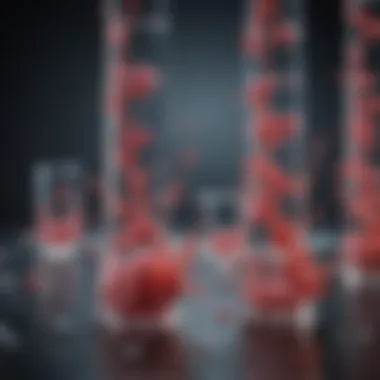

The production of ubiquitin antibodies is a pivotal aspect in the research of ubiquitination processes. These antibodies serve as indispensable tools for elucidating complex biological pathways. Understanding how to produce these antibodies effectively is crucial for advancing both basic and applied scientific research. They allow scientists to explore the intricate dance of proteins within the cell, making their production not just important but also a bit of a science unto itself.
Methods of Antibody Generation
Generating ubiquitin antibodies can be approached through various methodologies. Each method comes with its distinct advantages and limitations. Here’s a closer look:
- Hybridoma Technology
- Phage Display
- Recombinant DNA Technology
- Description: In classic hybridoma technology, B cells from immunized mice are fused with myeloma cells. The resulting hybrid cells, known as hybridomas, can produce specific antibodies against ubiquitin.
- Benefits: This technique allows for the production of monoclonal antibodies that are highly specific.
- Description: Phage display uses bacteriophages to express antibody fragments, which can then be screened for binding affinity to ubiquitin.
- Benefits: This method has the advantage of selecting high-affinity binders, potentially leading to more effective antibodies.
- Description: Genetic engineering is employed to produce antibodies in a controlled manner, often resulting in a more standardized yield.
- Benefits: This technique allows for fine-tuning of the antibodies, providing better specificity and reducing variability.
In choosing a method, researchers must consider factors like specificity, yield, and the intended application of the antibodies.
Purification Techniques
Once antibodies are generated, robust purification techniques are essential to isolate them from other serum proteins and contaminants. Here are some commonly utilized methods:
- Affinity Chromatography: This technique leverages the specific binding affinity between the antibody and a target antigen (like ubiquitin). A column is prepared with immobilized ubiquitin, allowing antibodies to pass through while unbound proteins are washed away. The bound antibodies can then be eluted in a more purified form.
- Protein A/G Affinity Purification: Here, the antibodies are purified based on their Fc region, using Protein A or G that binds to the Fc portion of IgG. This method is commonly used for human and mouse IgGs.
- Precipitation Techniques: Using polyethylene glycol or ammonium sulfate, antibodies can be precipitated out of serum. This method is less specific compared to the aforementioned techniques but is useful for initial purification.
Each purification technique has its pros and cons concerning yield, specificity, and time.
"Antibodies are but a window into the cellular dialogue that defines life itself."
In summary, understanding the methods of generation and purification of ubiquitin antibodies is vital for their effective application in research. As scientists refine these processes, the impact of ubiquitin antibodies on fields such as cancer research and neurobiology continues to grow. This blend of understanding and application sets the stage for future advancements in biological research.
Testing and Validation of Ubiquitin Antibodies
The credibility of scientific findings heavily leans on the robustness and reliability of the tools employed. When it comes to ubiquitin antibodies, testing and validation assume pivotal roles in ensuring that these biological reagents accurately and consistently produce the desired outcomes in experimental contexts. It's not just about having an antibody; it's about knowing its rectitude in various conditions. This section delves deep into these essential processes, highlighting their survival as a sine qua non in the pursuit of advancing our understanding of ubiquitin's multifaceted roles.
Assays for Functionality
A myriad of assays is available to assess the functionality of ubiquitin antibodies. Each method has its nuances, suitable for particular scenarios and research goals. For instance:
- Western Blotting: A staple in many laboratories, Western blotting allows researchers to confirm the presence of ubiquitin-modified proteins. Antibodies specifically against ubiquitin can reveal guiding insights into protein degradation pathways.
- Immunoprecipitation: Utilizing ubiquitin antibodies during immunoprecipitation helps researchers isolate and study ubiquitinated proteins from complex cellular samples. This method can highlight interactions and reveal binding dynamics that would otherwise remain concealed.
- ELISA (Enzyme-Linked Immunosorbent Assay): This quantitative assay allows the assessment of antibody affinity and specificity. It’s particularly useful for determining concentrations of ubiquitin and its conjugates in various samples.
While these assays provide essential information, the choice of the method should align with specific objectives. For instance, while Western blotting can visualize proteins, it might not provide the same quantitative insights as an ELISA.
"An assay's purpose dictates its design; hence, understanding is paramount."
Controls and Standardization
One cannot understate the importance of controls when it comes to validating ubiquitin antibodies. Without stringent controls, distinguishing meaningful data from background noise turns into an uphill battle. There are crucial considerations here, including:
- Positive and Negative Controls: Utilizing samples with known ubiquitination status acts as benchmarks. Positive controls verify that the antibody can indeed detect ubiquitin modifications, while negative controls ensure there are no false positives. Such controls instill confidence in the results obtained.
- Standardization of Protocols: Consistency in experimental procedures is the bedrock for reproducibility. Every lab should adhere to established protocols regarding methods of antibody handling, sample preparation, and assay execution.
- Comparative Analysis: Utilizing different antibodies against the same target can elucidate the effectiveness and specificity of each. Researchers often find that one antibody may show higher efficiency in one assay compared to another, leading to a more informed choice in future experiments.
Keeping these factors in mind safeguards the integrity of research findings, fortifying the conclusions drawn from experimental data. In the intricate world of ubiquitin antibodies, where every detail matters, ensuring stringent testing and validation is nothing short of essential.
Applications of Ubiquitin Antibodies in Research
Ubiquitin antibodies have carved a niche for themselves in the laboratory, acting as essential tools for scientists eager to untangle the complex mechanisms of cellular functions. Their importance extends beyond mere research applications; they serve as beacons of insight into diseases and biological processes. When used appropriately, these antibodies can shed light on protein interactions, degradation pathways, and regulatory mechanisms, all of which play pivotal roles in cellular homeostasis.
In the hands of researchers, ubiquitin antibodies can be effective in various experimental designs. They help in Western blotting, immunofluorescence, and other assays, ensuring that the nuances of protein behavior are captured accurately. Their specific targeting capabilities enable scientists to isolate proteins, unraveling their roles in various biological pathways.
Ubiquitin Antibodies in Cancer Research
Cancer remains one of the significant challenges in modern medicine, and understanding its molecular underpinnings is crucial for effective treatment strategies. Ubiquitin antibodies contribute immensely to cancer research by elucidating how proteins involved in the cell cycle and apoptosis are regulated.
The dysregulation of ubiquitination processes can lead to unchecked cell proliferation and survival, hallmarks of cancer. Utilizing these antibodies, researchers can identify and quantify ubiquitinated proteins in tumor tissues, profounding our understanding about potential biomarkers for prognosis. For instance, detecting altered levels of ubiquitin-conjugated substrates may indicate the presence of malignancies or reveal insights into their progression.
In addition, therapeutic avenues are being explored where targeting ubiquitination pathways could reinstate normal protein function. By modifying the activity of specific E3 ligases or deubiquitinating enzymes using engineered ubiquitin antibodies, researchers aim to develop innovative drug strategies to tackle tumors.
"Ubiquitin antibodies are not limited to detecting aberrant proteins; they hold the potential to redefine cancer treatment paradigms through targeted intervention."
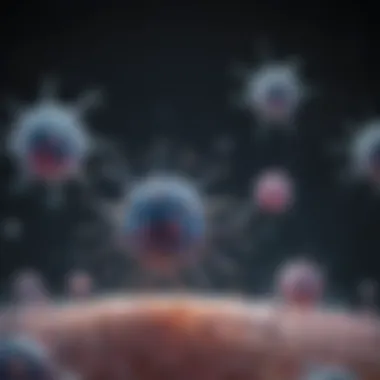
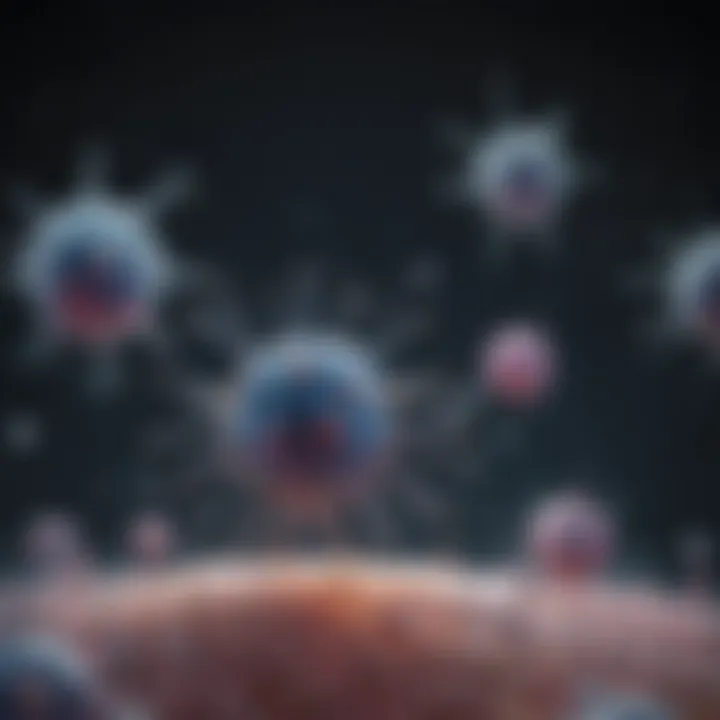
Role in Neurodegenerative Diseases
Neurodegenerative diseases, such as Alzheimer’s and Parkinson’s, present another frontier where ubiquitin antibodies prove invaluable. Misfolded or aggregated proteins are often implicated in these conditions, leading to neuronal death and cognitive decline. Here, the ability of ubiquitin antibodies to tag these proteins for degradation becomes paramount.
Researchers leverage these antibodies to investigate how protein aggregates like Amyloid-beta and Tau become dysfunctional in neuronal environments. By understanding the pathways through which these proteins evade the proteasome's scrutiny, scientists can better grasp the complexities of neurodegeneration.
In animal models, ubiquitin antibodies can help visualize the accumulation of pathological proteins in the brain. As therapies are developed to clear these aggregates, the effectiveness can be measured directly by monitoring changes in ubiquitin levels.
Moreover, recent findings suggest that enhancing the ubiquitin-proteasome system might be a promising strategy to treat neurodegenerative disorders. By integrating ubiquitin antibodies in clinical trials, the scientific community hopes to harness their potential for earlier diagnosis, intervention, and even prevention of these debilitating conditions.
Current Advancements in Ubiquitin Antibody Research
Research in ubiquitin antibodies has made significant headway, marking a shift in how scientists understand various biological processes. These advancements are crucial not only for basic science but also for their potential applications in therapeutic settings. The exploration of current advancements sheds light on emerging breakthroughs, the potential they hold for novel therapeutic strategies, and the intricate technologies being developed.
Emerging Technologies and Methods
The landscape of ubiquitin antibody research has seen a flurry of new technologies that enhance the capabilities of researchers. One of the most promising areas is high-throughput screening technologies. These advancements enable scientists to rapidly assess a vast array of antibodies against ubiquitin, essentially filtering through thousands of candidates. As a result, the identification of highly specific and efficient antibodies has become more practical.
Another noteworthy technological development is CRISPR-Cas9-based systems that allow for the precise manipulation of ubiquitin-related genes. This genomic editing tool not only aids in the creation of model organisms with specific ubiquitin pathway alterations but also facilitates deeper investigations into the functional role of specific ubiquitin modifications.
Moreover, nanobody technology showcases a fresh wave of techniques. Nanobodies, derived from camelids, are smaller than conventional antibodies yet exhibit high specificity and affinity. This characteristic makes them particularly useful in therapeutic applications and diagnostic tools.
"The evolution of antibody engineering has pushed the boundary of what scientists can achieve, unlocking potential treatments previously thought unattainable."
These methods are pivotal as they allow for a fine-tuned dissection of ubiquitin's role in various diseases, especially where traditional antibody methods fall short.
Trends in Scientific Investigations
There’s a noticeable shift in trends as well. Recent research pays close attention to the intersection of ubiquitin modulation and immune responses, linking it to cancer immunotherapy. This field is vibrant with studies investigating how manipulating ubiquitin pathways can enhance the efficacy of immune checkpoint inhibitors, offering a glimpse into future cancer therapies.
Furthermore, more groups are examining the role of ubiquitin modifications in neurodegenerative diseases. Research has expanded to not only look at ubiquitin as a mere participant in protein turnover, but as a crucial factor that might directly influence the pathological mechanisms of diseases such as Alzheimer’s and Parkinson’s. Researchers are aiming to untangle the connections between ubiquitin dysregulation and neuroprotection or neurotoxicity, driving the search for novel therapeutic strategies.
The focus on precision medicine also sees a rise. Individualized approaches are being developed where ubiquitin antibodies are tailored to patient-specific molecular profiles. By understanding a patient's unique biological landscape, treatments can be designed that are more likely to succeed.
These trends highlight the significant role of ubiquitin antibodies in pushing forward both fundamental research and clinical applications, serving as a powerful tool in modern medicine and biological sciences.
Future Perspectives for Ubiquitin Antibodies
The exploration into the future of ubiquitin antibodies is not just about what they have achieved but also what they might unlock in the world of biological research. As scientists deepen their understanding of ubiquitin’s role in various biological processes, these antibodies are poised to become critical tools in advancing our knowledge and therapeutic strategies. This section will discuss potential new applications and the challenges faced in this evolving field.
Potential New Applications
Ubiquitin antibodies hold a treasure trove of possibilities for novel applications across diverse areas of research:
- Therapeutic Development: As drug targets, specific ubiquitin modifications can be harnessed to develop personalized medicine approaches, especially in cancer treatment. Understanding how certain ubiquitin pathways contribute to tumor suppression or progression could lead to tailored therapies.
- Diagnostic Tools: Leveraging ubiquitin antibodies for biomarker discovery allows researchers to identify disease states or progression in neurodegenerative disorders. The detection of specific ubiquitinated proteins in patient samples can offer significant insights into diagnosis and treatment planning.
- Cellular Dynamics Studies: Ubiquitin antibodies provide an avenue to investigate protein-protein interactions within live cells. This could yield new insights into cellular signaling pathways and intracellular communication.
- Vaccine Development: Expedition towards utilizing ubiquitin antibodies in vaccine research is an intriguing path. For instance, in creating vaccines that can stimulate specific immune responses, understanding the ubiquitin modification of viral proteins could enhance the effectiveness of the immune response generated by the vaccine.
"The potential of ubiquitin antibodies transcends traditional roles, diversifying into therapeutic and diagnostic realms, which could change the game in medicine."
Challenges and Considerations
While the future looks promising, numerous challenges can test the progress of ubiquitin antibodies:
- Specificity and Cross-reactivity: Designing antibodies that precisely bind to their target ubiquitinated forms can be tricky. Cross-reactivity may lead to false positives, complicating the interpretations of experiments and hindering clinical applications.
- Production Costs and Scalability: The methods for producing high-quality ubiquitin antibodies can be resource-intensive. Finding efficient production techniques that maintain antibody integrity while reducing cost is crucial for widespread use in laboratories.
- Standardization of Assays: With new applications on the horizon, standardized assays are needed to evaluate the functionality of ubiquitin antibodies reliably. Differences in methods can yield varied results, complicating data comparison across studies.
- Ethical and Regulatory Hurdles: With increasing applications in human diagnostics and therapeutics, researchers must navigate ethical considerations and regulatory requirements, especially when human samples are involved.
In summary, while the prospective landscape for ubiquitin antibodies is vast and inviting, it is sprinkled with hurdles that demand attention. Addressing these challenges will be key to harnessing their full potential in scientific research.
Culmination
The conclusion of this article cradles the essence of what has been explored regarding ubiquitin antibodies. These antibodies have emerged as indispensable tools in biological research, paving pathways towards deeper understanding of protein regulation and degradation.
Summary of Key Points
To recap, ubiquitin antibodies play a pivotal role in various scientific domains:
- Ubiquitination: A cellular process critical for signaling mechanisms, with ubiquitin serving as a tag for protein degradation. This fundamental understanding hinges on the accurate utilization of ubiquitin antibodies.
- Research Applications: Particularly in cancer and neurodegenerative diseases, these antibodies allow researchers to probe into molecular pathways, providing insights that could someday lead to new therapeutic strategies.
- Production and Testing: The methodologies discussed for generating and validating these antibodies reflect the intricate processes involved to ensure their specificity and effectiveness in studies. From hybridoma technology to more contemporary techniques, the landscape is continually evolving.
The discussion leading up to this point illustrated how ubiquitin antibodies not only enhance research precision but also foster innovation in biotechnology and therapeutic development.
Final Thoughts on Ubiquitin Antibodies
Looking ahead, the future of ubiquitin antibodies seems bright but not without hurdles.
- Innovation: With emerging technologies, the scope of their applications is bound to expand. Researchers are finding new niches for these antibodies in diagnostics and personalized medicine, further emphasizing their significance.
- Challenges: Yet, challenges such as cross-reactivity and production scalability must be addressed. The quest for highly specific and efficient antibodies continues, driving both academic and commercial interest.



